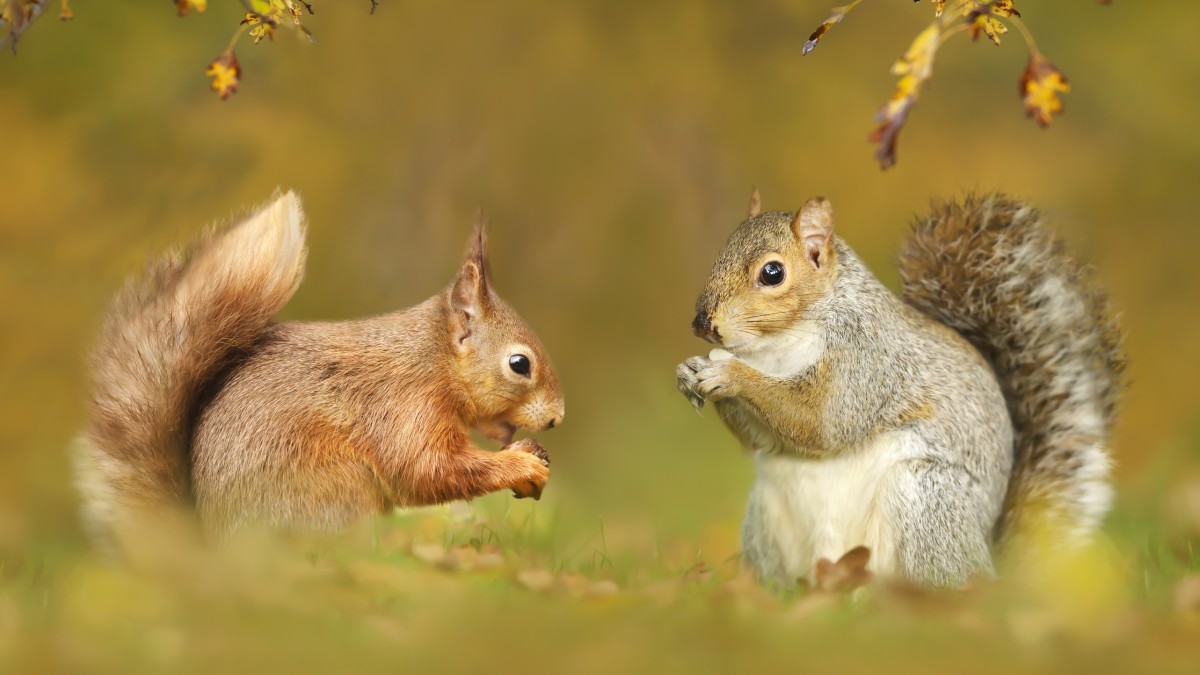Scientists are unravelling the secrets of red and grey squirrel competition
In a first of its kind study, researchers have identified significant differences between the diversity of gut bacteria in grey squirrels compared to red squirrels which could hold the key to further understanding the ability of grey squirrels to outcompete red squirrels in the UK.

New research, published in the Journal of Medical Microbiology, looked to understand more about the mechanisms by which grey squirrels are able to gain an advantage over red squirrels. Chris Nichols, Conservation Evidence Manager at the Woodland Trust, and co-author of the study, said:
“The more we know about grey squirrels, the more equipped we’re going to be in the future to tackle the threats they pose to red squirrels and our native trees, which is one of the biggest problems for forest conservation in the UK.”
Grey squirrels are an invasive, non-native species introduced from North America to sites in Great Britain and Ireland between 1876 to 1929. They out-compete the native red squirrels and multiply thanks to various traits including their ability to access a broader range of food sources including the bark of UK broadleaved trees. This causes significant damage to the trees, and is a behaviour that, prior to this research, was not completely understood.
To learn more about what gives grey squirrels an edge over red squirrels, researchers collaborating from the Woodland Trust, University of Surrey, University of Bangor and the Animal and Plant Health Agency analysed the gut microbiota of the two species. The diversity and abundance of the microbes that make up the gut microbiota (microbes living within a particular environment - in this case the squirrel gut) is often an indicator of the diet, level of health and immunity of an individual.
Researchers sampled bacterial DNA from the gut contents of red and grey squirrels and performed DNA sequencing to identify the bacterial groups present in the two species. They then compared the results to identify any key differences.
They found significant differences in the diversity of gut bacteria between the two types of squirrels, with grey squirrels having a more diverse range of microbiota in their gut.
Lead author of the study Professor Roberto La Ragione, Professor of Veterinary Microbiology and Pathology at the University of Surrey, explained: “Red squirrels are now an endangered species in the UK. Not only are grey squirrels larger and more robust than red squirrels, we have now identified a significant difference in their gut bacterial microbiota, potentially giving them another advantage over reds.”
This increased diversity in the grey squirrel gut microbiota could indicate improved general health and immunity compared to red squirrels. It could also reflect the grey squirrel’s broader diet, but crucially the difference between the two sample groups provides researchers with valuable information on the way in which grey squirrels are able to access a broader range of resources.
Researchers also identified the presence of oxalate-degrading bacteria in the guts of grey squirrels which means it is likely that they can digest calcium from tree bark and may explain the destructive bark stripping behaviour of the grey squirrels.
As this research was a sample of only UK red squirrels researchers hope that future research could look to mapping the gut microbiota of other native red squirrel populations across Europe to understand more.
Chris Nichols is optimistic about the implications of these findings. “More research needs to be done to further understand the relationship between red and grey squirrels and their gut microbiota, but perhaps in the future we could develop this research into methods that could promote healthy gut bacteria in red squirrels or new ways of preventing squirrels from damaging trees.”
Professor Ian Brown OBE, Animal and Plant Health Agency Director of Scientific Services, said:
“These findings will help further our understanding of the impact grey squirrels have on the UK’s red squirrel population and our vitally important trees and forests, which will in turn help us understand how best to protect them in the future.
“I am proud of APHA’s important work on this issue in partnership with the Microbiology Society, Woodland Trust, University of Bangor and the University of Surrey.”
NOTES FOR EDITORS:
The paper ‘Significant differences in the caecal bacterial microbiota of red and grey squirrels in Britain' by Lucy Hall, Christopher Nichols, Francesca Martelli, Joy Leng, Craig Shuttleworth and Roberto La Ragione will be published in Journal of Medical Microbiology at the following DOI: 10.1099/jmm.0.001793
For more information regarding the paper or to obtain a copy of the manuscript ahead of the lifting of the embargo please contact press@microbiologysociety.org.
Professor Roberto La Ragione, Professor of Veterinary Microbiology and Pathology at the University of Surrey and Dr Craig Shuttleworth, Honorary Visiting Research Fellow at the School of Natural Science, Bangor University, are available for interview. Please contact press@microbiologysociety.org or mediarelations@surrey.ac.uk
Image: iStock/Ian Groves
About the Microbiology Society
The Microbiology Society is a membership charity for scientists interested in microbes, their effects and their practical uses. It has a worldwide membership based in universities, industry, hospitals, research institutes, schools, and other organisations. Find out more at microbiologysociety.org.
For further information please contact press@microbiologysociety.org
About the University of Surrey
The University of Surrey is a research-intensive university, conducting world-leading research, delivering excellent innovation in teaching and producing highly employable graduates.
Areas of research focus include sustainability, connecting society and technology to equip humanity to live better, more sustainable lives; artificial intelligence, with research steering these new technologies so they remain people-centred in the way they operate, develop and are governed; and pushing the boundaries of our understanding of the ways human and animal health overlap, interact and share common problems and solutions – within a 'One Health, One Medicine' research approach.
The University is consistently independently ranked as high performing. In the most recent Research Excellence Framework (REF2021), the University ranked in the top 20 in the UK for the overall quality of research outputs. It is ranked 9th in the UK and 46th worldwide in the Times Higher Education Impact Rankings 2023, reflecting its dedication to the UN's Sustainable Development Goals. Within the UK, Surrey is 9th in the National Student Survey 2022, 13th in the Complete University Guide 2024, 22nd in The Times and The Sunday Times Good University Guide 2023, and 24th in The Guardian University Guide 2023.
To contact the media team please email mediarelations@surrey.ac.uk
About the Animal and Plant Health Agency
The Animal and Plant Health Agency (APHA) works across Great Britain to protect animal and plant health to benefit people, the economy, and the environment.
APHA is an executive agency of the Department for Environment, Food & Rural Affairs, and also works on behalf of the Scottish Government and Welsh Government.
APHA is responsible for responding to biosecurity threats to the UK from endemic or exotic animal diseases (including zoonotic diseases), pests and diseases of plants and bees, and invasive non-native species.
Our scientific expertise
APHA is one of the world’s leading research centres in the field of animal and veterinary public health.
APHA hosts 23 international reference laboratories, which are designated by the World Organisation for Animal Health (WOAH); World Health Organisation (WHO) and Food and Agriculture Organisation of the United Nations (FAO). APHA is the designated UK national reference laboratory for 49 diseases.
Jointly with the Centre for Environment, Fisheries and Aquaculture Science (Cefas) and the Veterinary Medicines Directorate (VMD) we are recognised by the FAO as the Reference Centre for Antimicrobial resistance. APHA published over 200 peer-reviewed papers in the past year and trained PhD and MSc students in a variety of scientific disciplines.
Media Contacts
External Communications and PR team
Phone: +44 (0)1483 684380 / 688914 / 684378
Email: mediarelations@surrey.ac.uk
Out of hours: +44 (0)7773 479911
